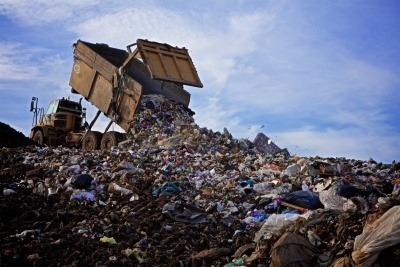UK makes progress towards zero food waste to landfill
 The UK has reduced the amount of food waste going to landfill by almost two million tonnes since 2013, according to a report from food waste recycling company ReFood.
The UK has reduced the amount of food waste going to landfill by almost two million tonnes since 2013, according to a report from food waste recycling company ReFood.
The report, titled ‘New Food Waste Horizons’, was launched at the UK AD and World Biogas Expo in Birmingham (3-4 July) and sets out the progress made by stakeholders across the food supply chain since the publication of ReFood’s 2013 report, ‘Vision 2020: UK roadmap to zero food waste to landfill’.
Vision 2020 highlighted the value of food waste and set out a variety of solutions for households and business to keep food out of landfill, where it produces the greenhouse gas methane.
Vision 2020 stated that the UK could save more than £17 billion a year if it achieved zero food waste to landfill by 2020, through a combination of solutions. It recommended a focus on ensuring that surplus edible food is redistributed to those in need, or sent for use as animal and pet food, while unavoidable, non-edible waste should be used to generate energy and organic fertiliser through anaerobic digestion (AD) and in-vessel composting processes.
At the time of Vision 2020’s publication, 14.8 million tonnes of food were being wasted, 40 per cent of which (5.92 million tonnes) was being sent to landfill. The most recent figures (from 2015) show some positive developments: the Waste and Resources Action Programme (WRAP) states that 10 million tonnes of food and drink is being wasted per year, 4.1 million tonnes of which was sent to landfill. However, this figure clearly remains much higher than it needs to be, with around seven million tonnes of food waste classed as ‘edible’.
“Across the board there have been both challenges and successes,” commented ReFood’s Commercial Director Philip Simpson.“The overall picture is extremely positive. As a nation, we still have a long way to go, but zero waste to landfill is becoming ever-more achievable.”
Actions by stakeholders
The report notes that a number of successes in the pursuit of food waste reduction have been made by stakeholders across the supply chain, from the food production stage through to retailers and all the way to our plates at home.

Changes in logistics and methods of food distribution have also contributed to lessening food waste in transit. Tesco no longer uses intermediary packhouses to get its produce to its supermarkets, and the total number of cases across all supermarkets that bypass packhouses has jumped from two million to 14 million, with produce going straight from the farm or factory to supermarket shelves.
Other actions from retailers include Sainsbury’s teaming up with ReFood in 2016 to power its supermarkets with biogas produced from its own food waste, while more retailers are partnering with redistribution charities – Tesco redistributed just under 8,000 tonnes of edible surplus in 2017/18.
Tesco has also begun scrapping ‘best before’ labels from a number of fruit and veg lines in a bid to prevent unnecessary waste by consumers due to confusion about what the labels mean.
However, according to food waste campaign charity Feedback, action by supermarkets remains generally inadequate, focusing on ‘media-friendly’ schemes that result in little meaningful change. The charity noted that only Tesco and Aldi have signed up to the UN Sustainable Development Goal of halving food waste by 2030.
Policy developments
While the UK is admittedly far from the goal of zero food waste to landfill, there has been policy progress in some areas. Northern Ireland introduced a ban on sending separately-collected food waste to landfill in 2015, and Scotland will be implementing a landfill ban for all biodegradable municipal waste (food, paper and garden waste) in 2021. In Wales, the Landfill Allowances Scheme has reduced the amount of biodegradable municipal waste to landfill by 88 per cent since 2004, with just under 106,000 tonnes sent to landfill in 2017/18 – 71 per cent less than the allowance.
As for England, the government’s Resources and Waste Strategy, published in December 2018, contains no commitment to an out-and-out ban on food waste to landfill, but a pledge to ‘work towards eliminating food waste to landfill by 2030’. ReFood’s new report welcomes this as a ‘strong step’ that ‘offers the opportunity to boost awareness of the commercial and environmental benefits of the [food] waste stream in its value for energy, nutrients for agriculture and, preferably, heat.’

The UK Government has been consulting on the prospect of separate food waste collections for England, a proposal that has been generally well-received as a measure to stimulate the country’s stagnating recycling rates.
In addition, the government has launched a £15-million food waste reduction scheme to focus mainly on waste in the retail and food manufacturing sectors. As part of this, £4.2 million of funding was awarded to four redistribution organisations in May to enable them to increase the amount of edible surplus food sent to people in need.
Despite this, industry figures commenting in the report expressed disappointment at an apparent “lack of energy” from government, as Lord Deben (Chair of the Vision 2020 panel) put it, meaning that “consumers are yet to play a driving role in the fight against food waste.”
Jeremy Jacobs, Technical Director at the Renewable Energy Association, added: “Our concern is that mandating zero food waste to landfill simply won’t happen. The logical, economic, sustainable and emotive arguments have been drilled into government, but are apparently falling on deaf ears… Despite government-level talk of the circular economy, leading the debate and embracing innovation, we still only recycle 14 per cent of food waste in the UK. This is a travesty.”
Many challenges remain
ReFood’s report is generally positive about the government’s approach to food waste, stating that the Resources and Waste Strategy offers ‘a firm policy direction for food waste that builds on the exciting foundations established over the past five years since the launch of the Vision 2020 Roadmap.’
“The commercial, environmental and societal benefits of tackling food waste have gained significant traction over the past few years and it is exciting to see what can be achieved,” Simpson concluded. “Challenges remain, not least the lack of consistency in food waste collections at local authority level, but the government’s Resources and Waste Strategy has the potential to provide a perfectly workable policy framework.
“Ultimately, responsibility lies with all of us, with businesses, with government, with local authorities, educators and consumers. We can all play our part, whether by preventing food waste in the home, asking for doggy bags in a restaurant, donating surplus food, or simply taking every opportunity to reduce, reuse and recycle wherever possible.”








